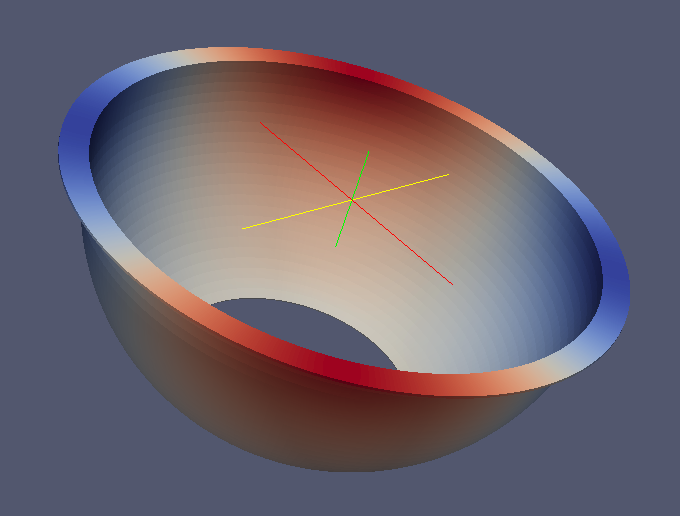Summary
AxFEM is a semi-analytic finite element code designed to simulate axisymmetric and nearly-axisymmetric vibrating structures, with a special emphasis on micro-scale solid-wave gyroscopes. It was written by Erdal Yilmaz (Ph.D., 2016) and myself. Our work was motivated by analysis of micro-scale versions of the Hemispherical Resonator Gyro (HRG) developed under the DARPA MRIG program and successors, which had the goal of producing micro-machined versions of vibrating structure. Our goal was to understand what aspects of the design and fabrication process would make such sensors most resistant to damping, drift, and other infelicities.
While micro-machined solid wave gyroscopes promise cost savings of several orders of magnitude over their conventional counterparts, typical MEMS processing leads to significantly larger variations in fabricated devices than one sees in standard HRGs. Fortunately, these variations are not completely arbitrary, but have structure inherited from the nature of the fabrication steps. Part of our goal with AxFEM was to provide detailed understanding of how breaking the idealized axisymmetric shape of the devices due to fabrication variation would affect the ultimate performance of the device. Performing such computational studies with fully-resolved three-dimensional finite elements is prohibitively expensive, so combine an analytic group-theoretic approach with finite element analysis to obtain an accurate “2.5d” simulation framework. Our results provided not only predictions of the quality factors, gain factors, and design sensitivity of several devices, but also a better understanding of the qualitative features of different fabrication errors that would lead to performance issues in devices.
Links
Papers
@article{2016-sensors,
author = {Yilmaz, Erdal and Bindel, David},
title = {Temperature Sensitivity and Shape Optimization of
Solid-State Wave Gyroscopes},
journal = {IEEE Sensors},
volume = {16},
number = {6},
pages = {6213--6221},
year = {2016},
doi = {10.1109/JSEN.2016.2580670}
}
Abstract:
We analyze the change of angular gain and vibration frequency of solid-state wave gyroscopes as a result of geometry perturbations due to thermal expansion. We analyze sensitivity of the device to thermal expansion effects by an isoparametric finite element analysis method, and we analyze the sensitivity to thermal changes in the material properties assuming a linear dependence on temperature. We quantify these sensitivities for common device geometries, and use our analysis as the basis for a local optimization problem that minimizes temperature sensitivity as a function of device shape.
@inproceedings{2016-hh-workshop,
author = {Yilmaz, Erdal and Bindel, David},
booktitle = {Proceedings of the Hilton Head Solid-Sate Sensor and
Actuator Workshop 2016},
title = {Temperature Sensitivity of Solid-Wave Gyroscopes (Late News)},
month = jun,
year = {2016}
}
Abstract:
We analyze the change of angular gain and vibration frequency of solid-wave gyroscopes as a result of geometry perturbations due to thermal expansion. We formulate a temperature sensitivity analysis by assuming a linear dependence of material properties to temperature, and quantify it for common device geometries.
@inproceedings{2013-sensors,
author = {Yilmaz, Erdal and Bindel, David},
title = {Effects of imperfections on solid-wave gyroscope dynamics},
booktitle = {Proceedings of IEEE SENSORS 2013},
month = nov,
year = {2013},
doi = {10.1109/ICSENS.2013.6688462}
}
Abstract:
Solid-wave gyroscopes are symmetric resonators that sense rotation by measuring how Coriolis forces perturb a degenerate mode pair. The idealized dynamics of these devices are described by ODE models of two identical oscillators coupled by a perturbation due to rotation. In miniaturized solid-wave gyroscopes, geometric distortions due to imperfect fabrication also perturb the dynamics, and this limits sensing accuracy. In this work, we describe how geometric imperfections affect the dynamics of solid-wave gyroscopes. We also use selection rules both to find qualitative information about what types of geometry perturbations most affect sensor performance and to accelerate computations
Talks
Music of the Microspheres
Cornell CS Visit Day
gyro mems
•
local
Music of the Microspheres
Cornell CS at 50, Gates Hall Open House Poster Session
gyro mems
•
local poster
Music of the Microspheres
Householder Symposium
gyro mems
•
meeting external invited plenary
Music of the Microspheres
Oxford University NA Seminar
gyro mems
•
seminar external invited
Music of the Microspheres
UMCP NA Seminar
gyro mems
•
seminar external invited
Music of the Microspheres
Seminar at UTRC
gyro mems survey
•
seminar external invited
A Tale of Two Eigenvalue Problems
Cornell Brownbag Seminar
gyro mems spechist
•
seminar local
Music of the Microspheres
Tufts/Schlumberger Scientific Computing Seminar
gyro mems
•
seminar external invited
Computer Aided Design of Micro-Electro-Mechanical Systems
Civil Engineering Seminar at Duke
gyro mems pml rf-mems rom ted
•
seminar external invited
Computer Aided Design of Micro-Electro-Mechanical Systems
SCMS Workshop on Recent Advances in Scientific Computing,
Fudan University
gyro mems pml rf-mems rom ted
•
meeting external invited
Computer Aided Design of Micro-Electro-Mechanical Systems
FIST Workshop at Shanghai Tech
gyro mems pml rf-mems rom ted
•
meeting external invited
AxFEM: Micro-Gyro Simulation and Modeling
DARPA MRIG Program Meeting
gyro mems
•
meeting external
Micro-Gyro Simulation and Modeling
DARPA Site Visit
gyro mems
•
local
